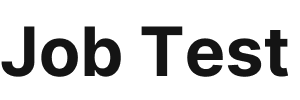Take Career Right for Me Quiz for Free to Get a Career Guidance

Take Career Quiz by Personality Now!
Start the TestFeeling lost about your career? Are you tired of jobs that don't fit? It's a common problem. Many people struggle to find work that truly excites them. But what if you could find a path that matches your unique self?
Personality-based career tests are a tool for just that. These tests can show you careers that fit your personality. This can lead to more job satisfaction. You may even perform better in a role that suits you. It's about finding the right road for your future.
Why Take an Online Career Test Based on Personality?
Using personality assessments for career advice is helpful for many reasons. It offers deeper self-understanding. It also suggests careers you might love. Let's explore the benefits.
Self-Discovery and Awareness
Career tests dive into who you are. They help you see your strengths and weaknesses. You'll learn about your core values and interests. This is key to a satisfying career.
For example, are you outgoing? You might enjoy sales or teaching. Are you more reserved? A job in research or writing might be a better fit. Understanding yourself is the first step.
Identifying Suitable Career Paths
These assessments match your traits with jobs. Maybe you've only considered a few careers. Tests can open your eyes to new options. You might find a dream job you never knew existed.
Improved Job Satisfaction
When your personality fits your job, you're often happier. Work feels less like a chore. A study showed that people are more satisfied when their career aligns with their personality. This leads to better overall well-being.
Understanding the Science Behind Personality-Based Career Assessments
These tests aren't just for fun. They are based on solid psychological ideas. This science helps make the tests reliable. Let's look at some key models.
The Myers-Briggs Type Indicator (MBTI) and Career Choices
The MBTI is a popular personality tool. It sorts people into 16 types. Each type has unique strengths. This framework is widely used in career guidance. However, the MBTI has critics. Some say it's too simple. Others question its reliability. Still, it can be a helpful starting point.
The Big Five Personality Traits (OCEAN)
The OCEAN model is another key tool. It looks at five broad traits. These include Openness, Conscientiousness, Extraversion, Agreeableness, and Neuroticism. Each trait connects to different career paths.
- Openness: Creative and curious people may thrive in art or science.
- Conscientiousness: Organized people could excel in project management or accounting.
- Extraversion: Outgoing people do well in sales or public relations.
- Agreeableness: Empathetic people might love social work or healthcare.
- Neuroticism: Those who are emotionally stable may do well in high-stress jobs.
Other Relevant Personality Models
The Holland Code is one such model. It focuses on matching interests to job types. This model helps people find careers that align with their passions.
Choosing the Right Online Career Test
Not all tests are created equal. It is important to pick one that is accurate. Do your research to find the best option.
Researching Test Providers
Check out the test provider before you begin. Look for reviews and testimonials. See if the test is based on research. A credible test is a must.
Ask these questions:
- Is the test based on a solid theory?
- Has the test been tested for reliability?
- What do other users say about their experience?
Understanding Test Formats and Features
Tests use different types of questions. Some are multiple-choice. Others ask you to react to scenarios. Look for clear, detailed reports. These reports should explain your results well.
Cost vs. Value
Some tests are free. Others cost money. Free tests may not be as accurate. Paid tests often give you more insight. Consider the value you'll get for the price. Don't choose a test based on price alone.
Interpreting Your Career Guidance Report
Once you've taken a test, review the report carefully. Understand what it's telling you. Use the info to guide your choices.
Understanding Your Personality Profile
The report will break down your personality. It'll show you where you score on different traits. Knowing this helps you see yourself more clearly.
For example, imagine a profile that shows high conscientiousness. This means you're likely organized and detail-oriented. This could mean a job in data analysis is for you.
Identifying Career Matches
The report will list possible careers for you. Read the job descriptions. Think about the skills needed. Also, consider the potential for growth in each role.
Research the suggested careers. Talk to people in those fields. This helps you see if a career is a good fit.
Developing an Action Plan
Use the report to make a career plan. Set goals that are specific, measurable, achievable, relevant, and time-bound (SMART). Find a mentor or coach to help you along the way.
Beyond the Report: Taking the Next Steps
A career test is just the start. Take action to explore your options. Gain experience and build your skills.
Networking and Informational Interviews
Talk to people in the careers you're considering. Ask them about their jobs. Learn about their day-to-day tasks. This is called an informational interview. It can give you great insight.
Internships and Volunteering
Get hands-on experience. Internships and volunteering can help you try out different roles. This is a great way to solidify your preferences.
Continuous Learning and Skill Development
Keep learning throughout your career. Take courses. Get certifications. Attend workshops. This will boost your skills and open new doors.
